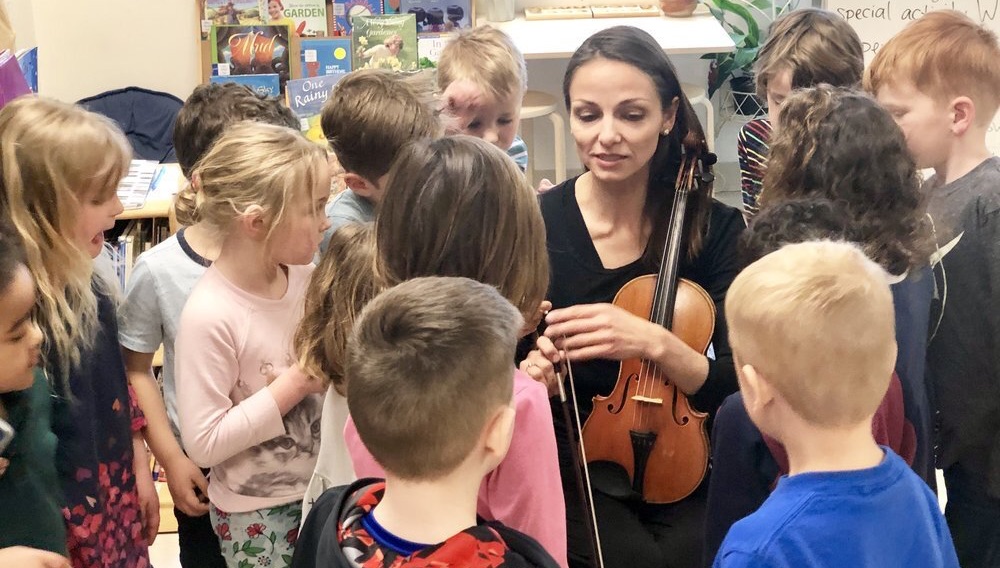In the acknowledgements of my 2017 book I thanked Philadelphia Orchestra conductor Ricardo Muti for allowing students to attend the symphony in 1987 for $2. Maestro Muti opened up the universe of classical music to me and countless others. Over the past thirty-five years I have attended hundreds of mind-altering, poignant classical performances, including the past few weekends watching Gustavo Dudamel conduct the Los Angeles Philharmonic.
Tatiana Berman is a violinist who is opening up universes to broader audiences through her project “The Power of Sound.”
I discovered Tatiana through the documentary “Forte” on AppleTV but was unaware of her interest in the intersection of music and psychology until I visited her website. She says, “Music is a language that can be understood across different cultures. In a way, I consider it my first language, and I can’t imagine my life without it. While listening to and/or practicing music, especially classical, we can travel through time, let our imagination run wild, and even work through solutions to problems.”
She speaks about the evidence buttressing her interest in music as a healing tool: “Our bodies are composed mostly of water, which happens to be an excellent conductor for vibrations, so essentially, we are walking conduits of sounds. As we are extremely sensitive to sound, noise, and music, they affect our emotions, behavior, and shape our reality. I became interested in the impact of noise pollution and sound on our everyday behavior and overall well-being. As a result, ‘The Power of Sound’ was born. The exploratory performance highlights how noise pollution can affect us on a cellular and psychological level, and showcases the intersection of ancient sound healing and modern music therapy.”
Tatiana’s “The Power of Sound” is an innovative new way of performing that explores music’s ability to heal while raising awareness regarding the transformational impact that sounds have on our everyday health and emotional well-being. Featuring customizable classical and contemporary repertoire, these performances include informative spoken vignettes that provide context for the corresponding pieces. There are many variations of the program ranging from solo to chamber music to orchestral.

Tatiana studied violin at the Yehudi Menuhin School and Royal College of Music in London and her distinctive performances have enabled her to play at Carnegie Hall and The Kennedy Center, plus the Elbphilharmonie Hamburg, Chicago Contemporary Art Museum, and Santa Fe Symphony.
Regarding the movie “Forte” and new opportunities offered for women in the world of classical music – particularly those like Tatiana who must balance motherhood with a vibrant professional career – Tatiana says, “The life of a musician is about connecting with audiences. This inherently involves frequent travel and presents a challenge for mothers who must balance career decisions with the schedules and needs of their children. Concerts and post-concert events with sponsors and supporters also typically require artists to work late into the evening, which is much different than the typical 9–5 work day. Then factor in the financial and emotional roller coaster of a career in the arts, the necessity for time and space to be creative and innovative, the focus required to be a fully attentive mother, and you will get an idea of the daily decisions and balancing act that is the life of a musician who is a mother.”
Recently I listened to Tatiana’s first “Not So Classical” CD and was moved to tears by the rich sound of her violin and her passionate interpretations of familiar classical pieces. Although I have sat through 6 1/2 hour performances such as that of “Tristan Und Isolde,” I greatly appreciated Tatiana’s carefully curated selections that are accessible to all.
Currently Tatiana is recording her next “Not So Classical” CD, touring “The Power of Sound” project, and directing a documentary film. She also leads workshops and gives lectures on the importance of music education, psychology and music, and culture. As I thanked Maestro Muti thirty years later for exposing me to the universe of classical music, I am certain that thousands of people will be thanking Tatiana Berman in the years to come for doing the same.


